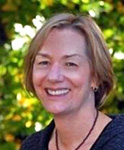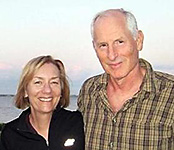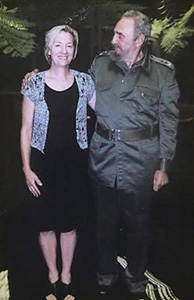Jenny Phillips (Lesotho), writer and award-winning filmmaker, dies at 76
Thanks for the ‘heads up’ from Susan Zawalich.
•
Jenny Phillips, writer and award-winning filmmaker, dies at 76
by Bryan Marquard Boston Globe staff
JULY 13, 2018
Mrs. Phillips sought Fidel Castro’s help in securing documents of Ernest Hemingway.
 In an Alabama prison, one of her several far-flung outposts of compassion and creativity, Jenny Phillips recorded her conversations with lifers and death row inmates — those discarded in “the dustbin of humanity,” she would later say.
In an Alabama prison, one of her several far-flung outposts of compassion and creativity, Jenny Phillips recorded her conversations with lifers and death row inmates — those discarded in “the dustbin of humanity,” she would later say.
Back home in Concord, she played the tapes as she drove, letting their voices fill her car and spark her imagination. “They wanted people to know their stories so they wouldn’t be forgotten,” Mrs. Phillips, who turned those initial encounters into an award-winning documentary, recalled a few years later, in 2008. “They also wanted their stories to somehow help other people. As well as a wish to be remembered, there’s a wish to be useful.”
Drawn early on to social justice, she found a unique path through a life that spanned continents and cultures, professions and pursuits. She was a nurse and psychotherapist, a writer and filmmaker. She built a clinic in Nigeria, treated patients in Lesotho’s mountains, cared for Inuit villagers in Labrador. She brought a meditation practice to hardened criminals and, just as improbably, bridged an international political divide while preserving Ernest Hemingway’s literary legacy in Cuba.
“She could even charm a dictator,” her husband, Frank, said of the time they dined with Fidel Castro while attempting to set free manuscripts Hemingway left behind. “This was Jenny’s life.”
Early Monday evening, Mrs. Phillips, her husband, and a friend were sailing in Nantucket’s Head of the Harbor when she decided to swim the quarter-mile or so back to shore. A strong swimmer, she was 76 and often leapt into the waves on the way home, but this time she apparently drowned and was found later along the shore of the island’s Wauwinet area.
“Jenny had an interest in racial justice and social justice from a very early age,” said her brother Maxwell King, “and she combined that with fierce strength of character.”
She was a producer, director, and writer for her first film, 2008’s “The Dhamma as the ‘House of Pain,’ the end of the line in Alabama’s prison system,” she wrote in a 2012 Huffington Post essay.
“There is a heavy atmosphere of misery, hopelessness, and violence,” she added, and after her first visit she wanted to “find out if there were solutions or alternatives to the aggressive culture of prison manhood. I wondered if it were possible for men in prison to live with a sense of inner peace and the freedom to experience and express a full range of emotions.”
The resulting film chronicled her collaboration with others to bring to the inmates Vipassana, an ancient meditation practice. A few years later, she edited a book of the prisoners’ writings, “Letters from the Dhamma Brothers: Meditation Behind Bars.”
She collected more awards producing and directing her second film, 2016’s “Beyond the Wall.” Set in Lawrence and Lowell, it focused on the efforts of counselor Louie Diaz, himself a former inmate, as he helped prisoners rebuild their lives after they were released.
“I can tell you right off the bat she changed my life,” said Diaz, who is now a re-entry and outreach specialist for the Middlesex Sheriff’s Office. “She was an amazing person who just had this way of seeing things. There was no ‘noing’ her. It was always, ‘Yes, we’ve got to get in there.’ ”
Mrs. Phillips was fearless while interviewing inmates and released prisoners, said Diaz, who added: “I don’t think she sees any bad in people.”
Her third film, as-yet untitled, is set in the formidable Louisiana State Penitentiary, known simply as Angola. “She bonded with all those guys,” Diaz said. “She’s sitting in these rooms all by herself with a killer, and not worried at all.”
Born in New York City, Jenny King was very young when her family moved to Alliance, Ohio, her father’s hometown. Dr. Robert G. King was a prominent physician in that small city southeast of Akron. Her mother, the former Louise Perkins, was known as Peggy, and was a daughter of Maxwell Perkins, the iconic literary editor of writers such as Hemingway, F. Scott Fitzgerald, and Thomas Wolfe.
As a child, Jenny attended a civil rights protest at Alliance’s City Hall, where she, her mother, and a brother were the only whites to join the demonstration. The experience was formative.
Mrs. Phillips wrote and directed several documentaries, including “The Dhamma Brothers.’’

Jenny and Frank
“She always wanted to shed that image of her elite background,” said her husband, Frank, (Lesotho 1967-69) the Globe’s longtime State House bureau chief.
The Kings sent their five children to boarding school — or tried to, anyway. Mrs. Phillips refused. “Jenny didn’t want to go to a place that was special and privileged. She wanted to go to high school like everyone else,” said her brother Max, who lives in Pittsburgh. “And then it turned out that she became the real academic in the family.”
In a family with no shortage of achievers — one sister is a writer, the other an artist; one brother is a newspaper editor, another is an actor — Mrs. Phillips charted her own course.
She graduated from Simmons College with a bachelor’s degree in nursing, was a registered nurse, and spent a college summer as a health care worker in remote Labrador.
While volunteering abroad for an American Friends Service Committee program, she met Frank Phillips during orientation.
“I was immediately smitten,” he recalled. “She was a beauty, she was dynamic, and she took over the whole group.”
He had returned to college when she and her mother joined the Rev. Martin Luther King Jr.’s 1965 march in Alabama from Selma to Montgomery. Frank flew down on his own, and as King spoke on the final day, he heard mention of a Boston delegation. “I wondered, ‘Is Jenny over there?’ I went running over and there she was,” Frank said. “She always said later in life that she fell in love with me then. We married the next year.”
Before settling in Concord, they joined the Peace Corps (1967-69) and served in Lesotho. At the end, they traveled through much of Africa by hitchhiking and by train en route home to Massachusetts.
Along with raising their two children, Mrs. Phillips became a cultural anthropologist, graduating from Boston University with a master’s and a doctorate in the field. She also received a master’s in psychiatric nursing and opened a psychotherapy practice.
And she wrote a book about Greater Boston’s Armenian-Americans — their culture and the challenges of assimilation.

Jenny Phillips and Fidel Castro
In 2002, she launched the Finca Vigia Foundation, named for Hemingway’s longtime home outside Havana. She cochaired the organization, which spearheaded preserving the home and digitalizing thousands of the author’s photographs and documents, including scores of letters.
The correspondence included an exchange between Hemingway and her grandfather who, citing the judgment of Mrs. Phillips’ then-young mother, persuaded Hemingway to scrap adding an epilogue to his novel “For Whom the Bell Tolls.”
Undaunted by the political hurdles in US-Cuba relations, Mrs. Phillips made inroads where others had failed. “She was just determined to get things done, to do justice, and to complete projects,” her husband said.
“Riding along with Jenny was an experience,” he added. “I just carried the bags and tried to keep up.”
A service will be announced for Mrs. Phillips, who in addition to her husband and brother leaves two children, Polly Phillips Gilbert of Concord and Maxwell of London; another brother, Perry King of Cool, Calif.; two sisters, Ruth King Porter of Adamant, Vt., and Polly King of Nyack, N.Y.; a grandson, and a granddaughter.
While Mrs. Phillips’s life was expansive geographically and intellectually, her work as a filmmaker in prisons became a defining chapter, rather than a coda.
“I clearly remember a hot summer day when I read a newspaper article in the town paper asking for volunteers to work with prisoners,” she wrote in a 2009 Huffington Post essay.
It was an invitation down a new path, to again help others in a place most feared to tread. “I always thought of myself as a healer for others in need,” she wrote. “I now realize I had much to learn about myself. And prison was to become my classroom.”
Jenny was an amazing person. She did so much in her all too brief life. Everyone she came into contact with learned and benefitted from knowing her.
She and Frank created the Finca Vigia Foundation which has digitized the many Hemingways documents that remained in his home which he called Lighthouse Farm in Cuba. The Foundation also send the digitized documents to the Kennedy Library in Boston where they many be read.
Currently, Finca Vigia is building, with the Minister of Culture, a workshop where the original documents will be preserved.
Finca Vigia is a living testimony to the vision and caring of Jenny Philips.
Ambassador Vicki Huddleston
I worked with Jenny Phillips in Lesotho in 1966 as nurse for catholic relieve services.
Bapse – I just read your note here. Jenny often wondered where you are, what you have done in your life. She loved working with you, you were one of her strongest memories of her time in Lesotho.
If you read this note, please write to and tell me where you are and about your life.
You can reach me at this email address : phillips@globe.com
Warm regards,
Frank